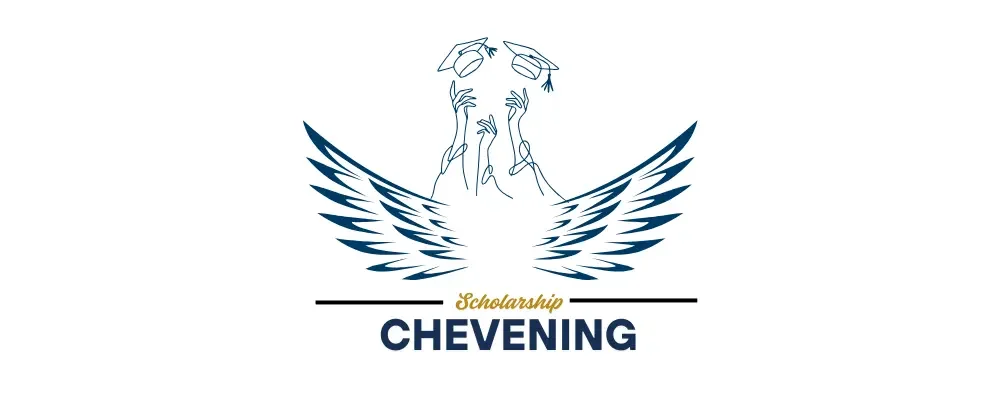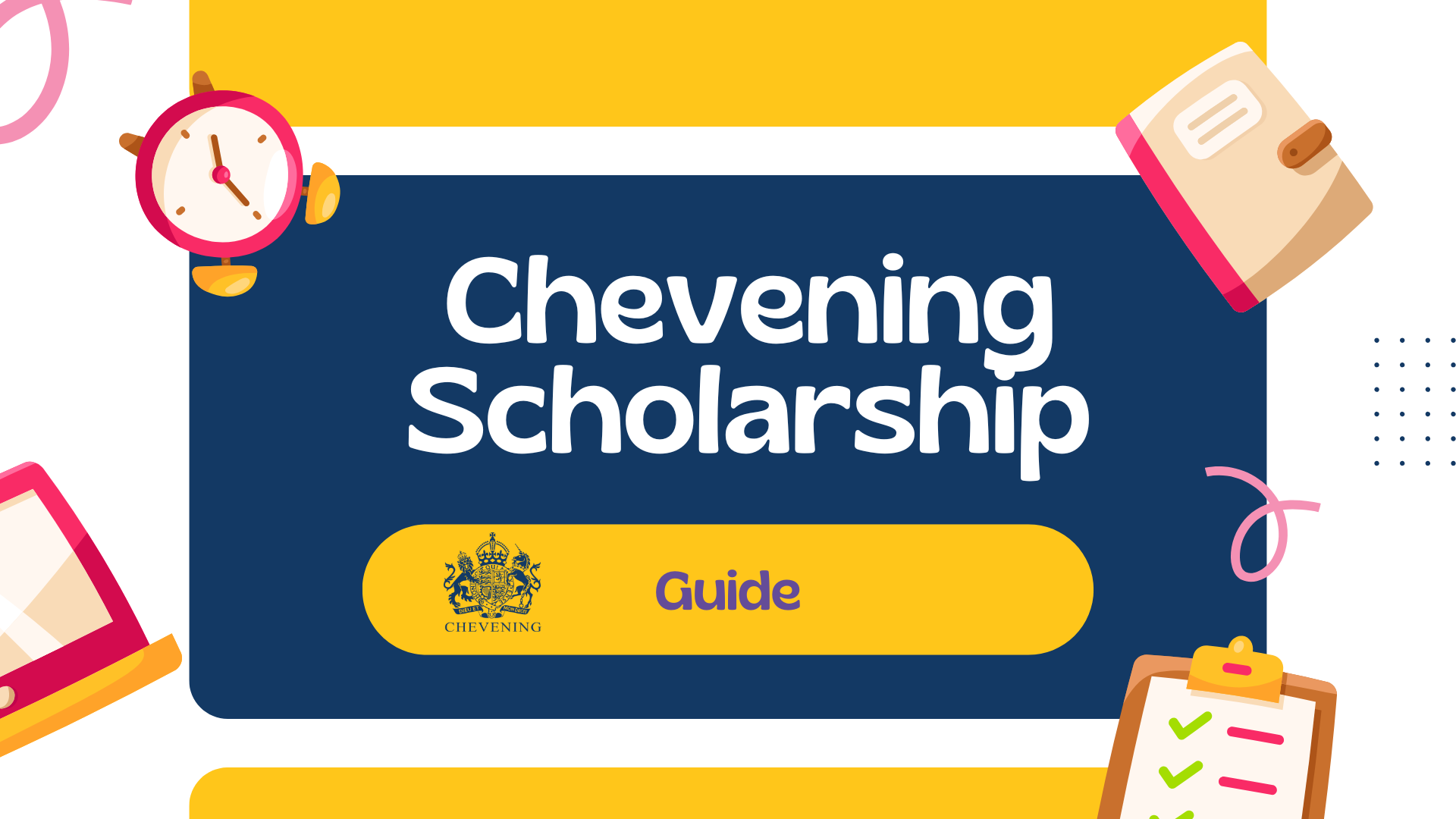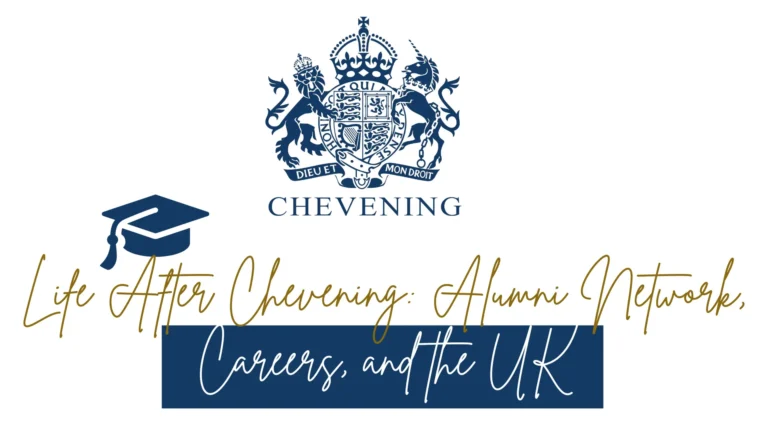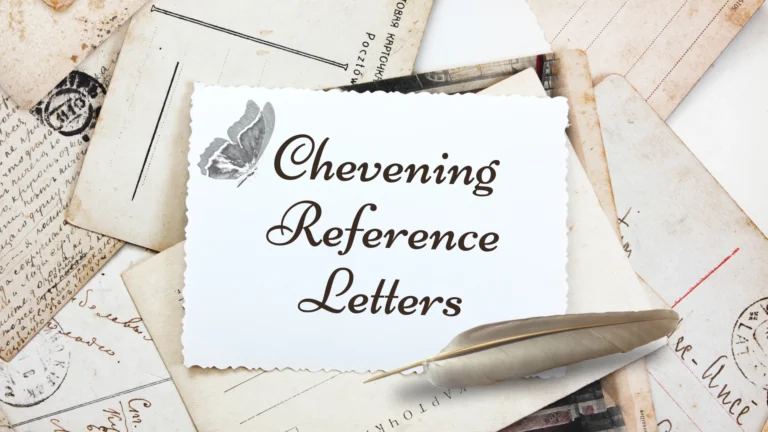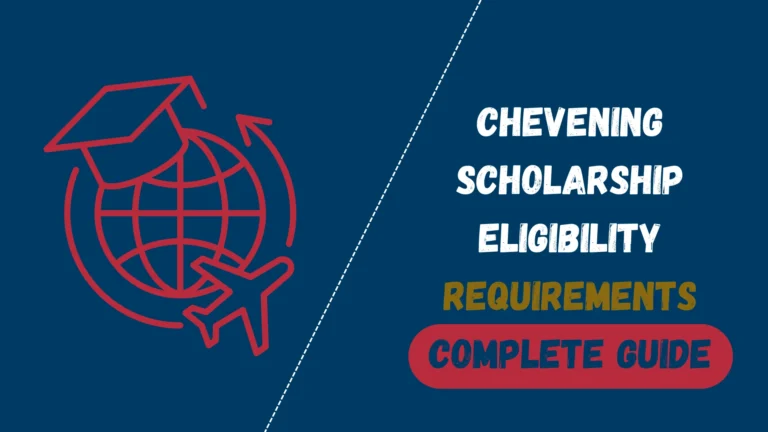Your Complete Chevening Scholarship Guide: From Application to Success
Here’s something nobody tells you about life-changing opportunities: they usually come disguised as really intimidating application forms.
The Chevening scholarship guide you’re reading right now? It exists because I’ve watched too many brilliant people talk themselves out of applying. They convince themselves they’re not “leadership material” or their English isn’t good enough or their university wasn’t prestigious enough. Meanwhile, someone with half their potential but twice their confidence is already drafting their essays.
So let’s get one thing straight from the start: if you’re reading this, you’re already doing better than the thousands of people who never even try. The Chevening Scholarship isn’t reserved for superhuman overachievers with perfect CVs. It’s for real people with genuine ambition and the guts to pursue it.
Let me walk you through exactly how to make this happen.
Understanding What You’re Actually Applying For
Before we dive into the Chevening application guide mechanics, let’s talk about what this scholarship actually represents.
Chevening isn’t just free education. If it were, you’d apply, get it, study, leave, done. But that’s not how this works.
What Chevening Really Is: A year-long intensive leadership development program that happens to include a master’s degree. The UK government invests roughly £30,000-50,000 per scholar not because they’re feeling generous, but because they’re making a calculated bet on future global leaders.
Think of it this way: you’re not asking for charity. You’re pitching yourself as an investment opportunity. And the returns they’re expecting? You going back home and creating meaningful change in your country while maintaining strong UK connections.
That perspective shift matters. It changes how you write your application, how you present yourself, and how confident you feel throughout the process.
The Chevening Eligibility Guide: Do You Actually Qualify?
Let’s start with the gatekeepers. No point perfecting your essays if you don’t meet the basic requirements.
The Non-Negotiable Requirements
1. Citizenship You must be a citizen of a Chevening-eligible country. Check the official list—it covers 160+ countries and territories. Most nations qualify, but there are exceptions based on diplomatic relations.
2. Academic Credentials You need an undergraduate degree that meets UK postgraduate entry requirements. Generally:
- Bachelor’s degree or equivalent
- At least upper second-class honors (2:1) or equivalent
- From a recognized institution
3. Work Experience Here’s where people get confused. You need 2,800 hours of work experience. That’s roughly:
- Two years of full-time work, OR
- Part-time work calculated cumulatively, OR
- Mix of paid work, internships, and volunteering
The work doesn’t need to be in one role or even in your study field. Quality and impact matter more than prestige.
4. University Applications This trips up so many applicants. You must apply to three different UK universities for three different master’s courses. Not three courses at one university. Three universities, three courses.
And here’s the kicker: you need at least one unconditional offer by the deadline specified in your award.
5. Return Commitment You must return to your country of citizenship for at least two years after your scholarship ends. This isn’t optional—it’s contractual.
Who Can’t Apply
You’re not eligible if you:
- Hold British or dual British citizenship
- Have previously studied in the UK with UK government funding
- Want to pursue a PhD (master’s only)
- Work for Her Majesty’s Government or British diplomatic missions
- Are applying while already living in the UK
The Chevening Course Selection Guide: Strategic Choices Matter
Choosing your three courses isn’t about finding the “best” universities. It’s about finding the right universities for your specific situation.
The Three-Course Strategy
Course 1: The Ambitious Reach Choose a competitive program at a top university. Think Russell Group institutions—Oxford, Cambridge, LSE, Imperial, UCL, Edinburgh, King’s College London.
Why it matters: If you get in, fantastic. If not, you have backups.
Course 2: The Solid Match A strong program at a reputable university where you’re very likely to be accepted based on your credentials.
Why it matters: This is your realistic target. Good university, good program, achievable acceptance.
Course 3: The Safety Net A quality program at a welcoming university that readily accepts international students.
Why it matters: You absolutely need at least one offer. This ensures you have one.
How to Choose Wisely
Research depth matters:
- Read actual course modules, not just descriptions
- Check who’s teaching (professors’ research interests)
- Look at facilities and resources
- Review alumni outcomes
- Consider location (London vs. other cities affects costs)
Alignment is crucial: Your three courses should:
- Connect logically to your career goals
- Build on your academic background
- Address specific skills gaps
- Show thoughtful selection, not random choices
Practical considerations:
- Application deadlines (some fill up fast)
- English language requirements (vary by course)
- Entry requirements (grades, prerequisites)
- International student acceptance rates
The Course Finder Tool
Use the Chevening course finder on their official website. It’s actually helpful, not just decorative. Filter by:
- Your academic background
- Career interests
- Preferred locations
- Course duration
But don’t rely solely on it. Visit university websites directly, read course handbooks, email admissions offices if you have questions.
The Chevening Scholarship Essay Guide: Writing That Wins
Right. Essays. The part that makes otherwise confident professionals suddenly doubt their ability to form coherent sentences.
Let’s demystify this.
Understanding What They’re Actually Reading For
The panel isn’t looking for:
- Perfect grammar and fancy vocabulary
- Impressive name-dropping
- Philosophical musings about leadership
- Generic statements about helping humanity
They’re looking for:
- Specific, concrete examples
- Clear evidence of impact
- Authentic voice and genuine motivation
- Logical connection between past, present, and future
Essay 1: Leadership and Influence (500 words)
The Real Question Behind the Question: “Have you actually led anything, or do you just have opinions about leadership?”
What Works:
Structure:
- Brief intro (50 words): Context about your leadership philosophy
- Example 1 (140 words): Specific leadership situation
- Example 2 (140 words): Different type of leadership
- Example 3 (140 words): Another dimension of your leadership
- Conclusion (30 words): Connect to future impact
Each example needs:
- Situation: What was happening?
- Challenge: What problem needed solving?
- Your Action: What did YOU specifically do?
- Result: What changed? (Numbers help)
- Learning: What did this teach you?
What Doesn’t Work:
- “I am a natural leader who inspires my team”
- “I led a project” (led how? what did you do?)
- Examples where you were a passive participant
- Vague outcomes like “improved efficiency”
Pro Tip: Write like you’re telling a friend about something cool you did. Then clean it up professionally. The energy of the original should remain.
Essay 2: Networking Skills (500 words)
The Real Question: “Will you actually engage with other scholars, or will you be a loner who takes the money and disappears?”
What to Show:
Your networking approach:
- How you build professional relationships
- Why networking matters to you (beyond job hunting)
- Evidence you understand it’s about mutual benefit
Concrete examples:
- Time you created or leveraged a network to achieve something
- How you’ve maintained professional relationships over time
- Specific instance where networking created opportunities
Future engagement:
- How you’ll contribute to the Chevening community
- Specific ways you’ll use the network
- What you’ll bring to the table (not just take)
Avoid:
- Making it sound transactional (“I network to get ahead”)
- Bragging about LinkedIn connections
- Forgetting to mention how you help others
- Generic statements about “the importance of networking”
Chevening Scholarships Eligibility for Pakistani Students: Your Complete 2025 Guide
Essay 3: Career Plan (500 words)
This is your Chevening career plan guide moment. Get this right and everything clicks into place.
The Real Question: “Is this master’s degree actually necessary for your goals, and are you genuinely committed to using it at home?”
The Winning Structure:
Context (75 words): Current state of your sector in your country. Why does this matter?
Short-term (150 words): First 2-3 years after returning:
- Specific role or organization
- Particular projects you’ll tackle
- How your master’s enables this
- Immediate impact you’ll create
Medium-term (150 words): 5-7 years out:
- Career progression (be ambitious but realistic)
- Broader influence and leadership
- Scale of impact
Long-term (100 words): 10+ years:
- Senior leadership position
- System-level change you hope to influence
- Your ultimate contribution
UK Connection (25 words): How UK expertise in your field connects to your goals
Fatal Mistakes:
- Vague goals (“help my community”)
- Plans that don’t require a master’s
- Suggesting you want to stay abroad
- Unrealistic ambitions (president by year 5)
Essay 4: Course Justification (500 words)
The Real Question: “Did you actually research these courses, or did you just pick three random universities?”
What They Want to See:
For each course (130 words each):
- Why this specific program
- Particular modules that address your needs
- How it fills gaps in your knowledge
- Professors or facilities that attracted you
- How it connects to your career plan
Overall logic (100 words):
- Why UK specifically
- Why a master’s now
- Why these fields of study
Research that shows:
- You’ve read course handbooks
- You know specific module names
- You understand the teaching approach
- You can explain why Course A vs. Course B
The Chevening Interview Preparation Guide: Final Stage Success
You made it past the paper sift. Congratulations—you’re already in the top 15-20% of applicants. Now comes the conversation.
What the Interview Actually Tests
They’re assessing:
- Can you articulate thoughts clearly in person?
- Does your personality match your essays?
- Will you represent Chevening well?
- Are you genuinely committed to your plans?
- How do you handle unexpected questions?
They’re NOT testing:
- Your memorization abilities
- How well you can sound robotic
- Whether you can recite your essays
- If you know every detail about UK politics
Common Question Categories
About Your Application:
- “Tell us more about [specific example from essays]”
- “Why these three universities?”
- “Walk us through your career plan”
- “What challenges do you anticipate?”
About Your Sector:
- “What are the biggest issues facing [your field] in [your country]?”
- “Who are the leaders you admire in your area?”
- “How will UK education specifically help you?”
- “What UK-[your country] collaborations exist in your sector?”
About You:
- “What’s your biggest failure and what did you learn?”
- “How do you handle disagreement?”
- “What will you contribute to your Chevening cohort?”
- “Why should we choose you?”
Preparation Strategy
Two Weeks Before:
- Reread your application thoroughly
- Research current affairs in your sector
- Practice common questions with friends
- Prepare questions to ask them
- Plan your outfit and logistics
The Day Of:
- Arrive 15 minutes early
- Bring a copy of your application
- Turn off your phone completely
- Take deep breaths
- Remember: they already think you’re impressive (that’s why you’re here)
During the Interview:
- Make eye contact with all panel members
- It’s okay to pause and think before answering
- Use specific examples, not generalizations
- Show enthusiasm (you’re excited about this!)
- If you don’t know something, say so honestly
The Chevening Application Timeline Guide: Critical Dates
Chevening scholarship deadlines are non-negotiable. Miss them and you wait another year.
The Annual Cycle
| Timeline | Action Items | Priority |
|---|---|---|
| August | Applications open | Start immediately |
| August-October | University applications | Apply early |
| Early November | Application deadline | Submit 1 week early |
| December-February | Review period | Wait patiently |
| February-May | Interviews | Prepare thoroughly |
| June-July | Final decisions | Cross fingers |
| July-August | Conditional offers | Meet conditions |
| September | Depart for UK | Start adventure |
Your Personal Timeline
6 Months Before Deadline: □ Research universities □ Identify referees □ Start gathering documents □ Connect with alumni
4 Months Before: □ Draft essays □ Request references □ Begin university applications □ Research your sector
2 Months Before: □ Finalize course choices □ Polish essays □ Complete university applications □ Get feedback on essays
1 Month Before: □ Submit university applications □ Complete Chevening form □ Triple-check everything □ Submit (don’t wait until last day!)
Chevening Scholarship Success Guide: What Actually Works
Let’s talk about Chevening application tips guide that separate successful candidates from the rest.
What Strong Applications Have in Common
1. Specificity Over Generalization Weak: “I led a team to success” Strong: “I led a 12-person team to reduce processing time from 48 hours to 6 hours, increasing client satisfaction by 40%”
2. Authenticity Over Performance They can tell when you’re being genuine vs. trying to sound impressive. Be yourself, just the most focused, articulate version.
3. Impact Over Activities They don’t care about your job title. They care about what you’ve actually changed, created, or improved.
4. Coherence Over Impressiveness A clear, logical story from where you’ve been to where you’re going beats random impressive achievements.
5. Research Over Assumptions Generic praise of UK education fails. Specific knowledge of particular courses, professors, and programs wins.
Common Mistakes That Sink Applications
❌ Starting too late (rushed applications show) ❌ Generic essays (could apply to anyone) ❌ Weak university choices (no strategy) ❌ Poor references (from people who barely know you) ❌ Unclear career plans (vague future goals) ❌ No proofreading (typos and errors everywhere) ❌ Forgetting the return commitment (plans suggest staying abroad)
The Mindset That Wins
You’re not begging for a favor. You’re proposing a mutually beneficial partnership. UK invests in your education; you return home and create positive change while maintaining UK connections.
That confidence—not arrogance, but genuine confidence in your potential—comes through in every part of your application.
Chevening Financial Support Guide: Managing Your Year
The Chevening financial guide is straightforward: they give you enough to live comfortably as a student. Not luxuriously, but comfortably.
What You Get
Covered:
- Full tuition (paid directly to university)
- Monthly stipend (£1,133-1,347 depending on location)
- Return flights
- Arrival allowance
- Visa costs
- Travel grants for Chevening events
Not Covered:
- Family/dependents
- Extra trips home
- Car ownership
- Entertainment beyond modest budget
- Debt repayment
Making It Work
Budget realistically:
- Rent: 40-60% of stipend
- Food: 15-20%
- Transport: 8-10%
- Personal expenses: 10-15%
- Emergency fund: 5-10%
Money-saving strategies:
- University accommodation (often cheapest)
- Cook at home (UK groceries are affordable)
- Student discounts everywhere (always ask!)
- Walk or cycle (healthy and free)
- Free museums and cultural activities
Your Next Steps: Taking Action Today
Look, you’ve read this entire Chevening scholarship guide. That’s more research than most applicants do. But reading doesn’t get you the scholarship—action does.
What to Do Right Now
1. Check eligibility (10 minutes) Visit the official Chevening website and confirm you meet all requirements.
2. Create a timeline (30 minutes) Mark all deadlines in your calendar. Work backward to create your preparation schedule.
3. Start a document (1 hour) Open a document and brain-dump:
- Your leadership experiences
- Your professional network examples
- Your career goals
- Potential university courses
4. Contact potential referees (this week) Reach out to two people who know your work well and would write strong references.
5. Research universities (ongoing) Spend an hour each week researching potential courses. Take notes.
Beyond Chevening: Your Guide to Elite Scholarships That’ll Change Your Life
The Reality Check
Will you get it? Maybe. The competition is fierce—about 2.5% acceptance rate.
But here’s what I know: you definitely won’t get it if you don’t apply. And the application process itself—forcing you to articulate your goals, reflect on your leadership, clarify your vision—that’s valuable regardless of outcome.
Plus, many successful Chevening scholars didn’t get it their first time. They applied, learned from feedback, improved, and tried again.
Final Thoughts: Your Moment to Lead
The Chevening scholarship program guide ultimately comes down to this: they’re looking for people who will use education as a tool for positive change.
Not perfect people. Not people with flawless CVs. Not people from prestigious backgrounds.
They want people with:
- Clear vision for impact
- Demonstrated leadership ability
- Genuine commitment to their home country
- The drive to actually follow through
If that describes you, stop doubting yourself and start applying.
Your country needs leaders. Your sector needs innovators. Your community needs champions.
Maybe you’re one of them. There’s only one way to find out.
Start your application today. Your future is waiting.
Need more specific guidance? Check out our detailed resources on essay writing, interview preparation, and university selection. Success loves preparation—let’s get you ready.
